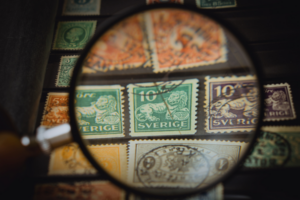
Hot property: Do you own some hidden treasure? Part 2
If you haven't read our previous article on collectibles, start there. It gives a solid introduction to what we'll discuss next: what makes certain items so special and potentially valuable.
With that foundation set, you might now ask: Is diving into the world of collectibles a good idea? Where should you start hunting for these prized items? And once you've got them, how do you ensure they're protected? And perhaps a concern on many minds: what if you accidentally buy a fake?

So let’s start digging a bit further into the world of hidden treasures.
Is it worth getting into collectibles?
The allure of unearthing a hidden gem or owning a piece of history can be a thrilling adventure, filled with historical discoveries and the chance to possess rare items. But is it worth the time, effort, and, often, significant financial investment? Let's weigh the pros and cons:
Pros:
-
- Joy of the journey - For many, collecting is less about the potential financial gain and more about the joy of the hunt, the stories behind each item, and the personal connection to a particular era or subject.
- Financial upside - While not guaranteed, some collectibles have shown impressive appreciation over time. For instance, rare coins, art, and vintage toys have seen their values skyrocket in specific markets.
- Asset diversification - By adding collectibles to your asset mix, you can hedge against the ebbs and flows of traditional markets. Unlike stares or real estate, the value of collectibles might not move in tandem with mainstream markets.
- Creating a legacy - A well-curated collection can become a treasured family heirloom, reflecting a person's unique passions and curiosities.
- Community connection - The collectibles arena offers a chance to connect with fellow enthusiasts. Collector clubs, conventions, and online forums offer opportunities to learn, share, and form lasting friendships.
Cons:
-
- Fluctuating markets - The value of collectibles can be unpredictable. What's in demand today might fall out of favour tomorrow. Market trends, economic conditions, and even pop culture can influence prices.
- Care and upkeep - Collectibles often require proper storage to maintain their condition. This can mean controlled environments, insurance, and regular maintenance, all with costs.
- Selling challenges - Unlike quick-to-liquidate assets like shares, selling a collectible can be a lengthy process, requiring patience and the right buyer.
- Counterfeit concerns - The collectibles market, especially for high-value items, is rife with fakes and reproductions. Determining an item's authenticity can be a challenging and sometimes pricey task.
- Startup costs - Launching a collection, especially in popular categories, can require a hefty initial outlay.
Getting into the world of collectibles should be a decision driven by passion first and investment second. While there's potential for financial gain, the true value often lies in the personal satisfaction and joy of collecting. If you're considering diving in, start small, do your research, and, most importantly, collect what you love. The journey of discovery, learning, and connection to history can be enriching in itself.
Where should you buy from?
When navigating the world of collectibles, knowing the best places to find authentic, valuable, and high-quality items is crucial. Let's explore the venues that can significantly influence the authenticity, price, and overall quality of the items you acquire.
Antique shops and flea markets

These are classic hunting grounds for collectors. Antique shops often curate their collections, offering items ranging from vintage furniture to rare coins. Flea markets, on the other hand, are more like treasure hunts. Amidst the clutter, you might just stumble upon a hidden gem at an unbeatable price.
Online auction sites
Platforms such as eBay, Heritage Auctions, and Catawiki have revolutionised the collectibles market. They offer a vast array of items from sellers around the world. While buying online provides convenience and a broader selection, it's essential to be cautious. Always check seller reviews, ask for additional photos or documentation, and be wary of deals that seem too good to be true.
Estate sales
Often organised when families decide to liquidate long-held assets, estate sales can be treasure troves, presenting unique items steeped in personal histories.
Specialist dealers
If you are looking for specific items, especially high-value or rare collectibles, specialist dealers are the way to go. These experts bring years of specialised experience, offering guidance on an item's authenticity and worth.
Collector shows and conventions
These events are a melting pot for enthusiasts offering a chance to buy, sell, or trade items. They're also excellent places to network, learn from seasoned collectors, and attend workshops or seminars.
Local auction houses
While names like Sotheby's or Christie's dominate the headlines, many local auction houses also offer a range of collectibles. These local events can be less intimidating for novice collectors and often feature items connected to the local history or culture.
Can I insure my collectibles?
Collectibles, much like other valuable assets, are vulnerable to risks including theft, damage, and loss. Insuring your prized possessions provides a safety net, ensuring you're financially protected should the unexpected occur. Here's a breakdown of what you need to consider when insuring your treasures:
Standard home insurance vs. specialised collectible insurance
While your standard home or renters insurance might offer some coverage for personal belongings, it often falls short when it comes to collectibles. These policies limit payouts for specific categories or may not cover the full value of rare or high-end items. This is where specialised collectible insurance may be required. Custom-made for collectors, these policies cater specifically to the needs of collectibles, ensuring more comprehensive coverage.
Appraisals are key
To get the right insurance coverage, you need to know the current market value of your collectibles. Frequent expert appraisals are vital. Besides determining accurate value, they offer essential documentation that can speed up the claims process.
Coverage types
When selecting a policy, pay attention to its coverage type. "All-risk" policies provide comprehensive protection, covering various potential damages or losses. On the other hand, "named-peril" policies only cover specific risks listed in the policy. It's also worth checking if the policy offers "agreed value" coverage, which guarantees you'll receive the insured amount without depreciation in the event of a total loss.
Consider additional protections
Some policies offer additional protections, such as coverage for items in transit (useful for those who travel with their collectibles or loan them to exhibitions) or any sudden and accidental breakage.
Review and update regularly
The world of collectibles is dynamic, with fluctuating market values based on demand, trends, and other factors. Therefore, regularly reviewing and updating your insurance to match the current value of your collection is essential.
Costs and deductibles
As with all insurance, there will be premiums and potential deductibles to consider. The premiums for your collectible insurance will be influenced by the items' worth, chosen coverage, and factors like how you store and protect your collectibles.
Will I be required to store the items in a particular way?

Many insurance companies have specific storage and care requirements to ensure the items remain in good condition and are protected from potential risks of damage, theft, or loss. Here's a breakdown of potential requirements:
-
- Security measures - Insurers often require that high-value collectibles be stored securely. This could mean a home with a security system, secure display cases with locks, or even a safe for particularly valuable or small items.
- Climate considerations - Items sensitive to environmental factors like art, vintage garments, or stamps might need climate-controlled storage. This ensures protection against damage from variances in humidity, temperature, or light.
- Fire safety measures - Some insurance policies might mandate smoke detectors, fire alarms, and even fire suppression systems, especially if the collection is of significant value or is stored in a dedicated space.
- Flood prevention - In areas vulnerable to flooding, collectibles might need elevation or waterproof container storage.
- Commitment to maintenance - Items demanding regular care, such as vintage cars or antique furniture, might come with a stipulation for regular maintenance to ensure the collectibles remain in good condition.
- Documentation and appraisals - Even though it's not a direct storage requirement, periodic expert appraisals can be mandatory. Additionally, maintaining a comprehensive inventory, with associated photos and authenticity certificates, can be invaluable.
- Tailored requirements for unique items - Specific collectibles come with unique needs. For instance, wines might require horizontal storage in dedicated wine refrigerators, while old manuscripts or comics could necessitate acid-free preservation methods.
- Transportation guidelines - If you frequently move or travel with your collectibles, the insurance company might have guidelines on how items should be packed and transported to ensure their safety.
When treasures turn tricky
If you find yourself in a situation where you believe you've been misled or sold a counterfeit item, start by reaching out to the customer service or resolution centre of the platform where you made the purchase. If you used a service like PayPal or a credit card, you could file a dispute with them. Platforms like eBay have buyer protection programs in place. If an item you receive doesn't match the listing description or is counterfeit, you can open a case with eBay's resolution centre. Always check seller feedback and ratings before buying, but beware of fake reviews.
Getting a refund is possible through the selling platform if a buyer's complaint is valid under their protection programs. If you paid with a credit card, you can initiate a chargeback for transactions that didn't meet the terms of sale.
If the seller is in Australia, the Australian Competition and Consumer Commission (ACCC) can provide guidance on consumer rights and might assist in some disputes. But bear in mind that consumer guarantees don’t apply to items bought under auction or at garage sales. Consider these purchases as final.
As a last resort, if the amount involved is significant and other avenues have failed, you might consider legal action, though this can be time-consuming and costly. Or lodge a complaint with us, and we’ll handle it for you.






